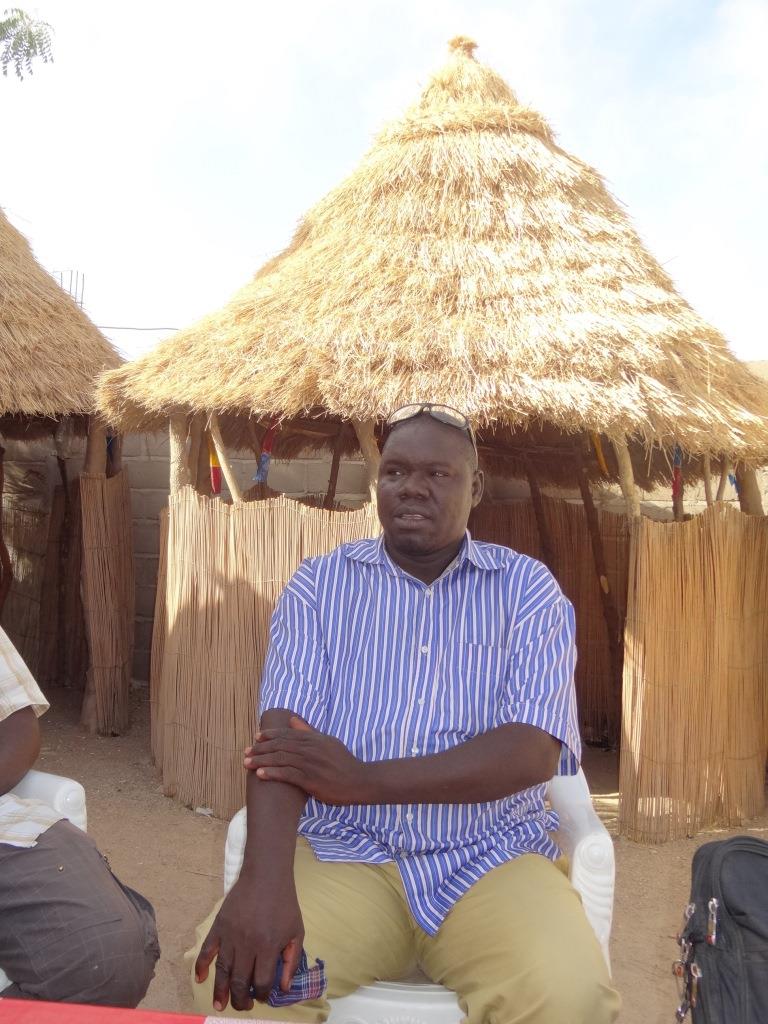Defending Community Rights in Cameroon Despite Intimidation and Threats
By Jaff Napoleon Bamenjo, Coordinator of RELUFA, Joining Hands Cameroon

CIMENCAM Plant in the heart Figuil, Cameroon. Photo Credit: Jaff Napoleon Bamenjo.
The beautiful city of Figuil in North Cameroon seems very poor when one examines the living conditions of people in the area, and the lack of infrastructure including roads, schools and hospitals. However, very few in Cameroon know that Figuil is actually very rich in natural resources.
For more than 50 years, Cimencam, a joint company between Lafarge, a French multinational, and the Cameroonian government, has been exploiting limestone to produce cement for the construction of homes in the country. When visiting Figuil, the first thing you notice is the constant cloud of dust that billows up from the cement plant and surrounds the city.
Figuil is also home to another multinational called Rocaglia that mines limestone for the production of crushed limestone, marble tiles, and granite. The company contributes to deforestation in the area, a region where the desert is expanding every day, by cutting trees to fuel its smelter. The constant burning of wood contributes to pollution and creates clouds of smoke that add to the ones produced by Cimencam.
The industrial pollution and deforestation have been contributing to poorer health conditions there, with more than 20% of people reporting respiratory problems. Cimencam, Rocaglia and the government of Cameroon promised that the mines would lead to the development of Figuil, a city of about 70,000 people, however these promises have yet to be fulfilled.
Norbert Bouba, a community rights defender in Cameroon, has over the past five years been working hard to defend the rights and interests of his community. Norbert is the president of a local civil society organization called CELPRO (or Watch Group for the Protection of Victims of Mining Activities) based in Figuil.
CELPRO has been very active in working to protect the environment, check and denounce abuses and advocate for the effective payment of mining royalties to local communities in Figuil. Bouba’s work with CELPRO has attracted a lot of attention and admiration locally as well as nationally. But CELPRO’s work has also attracted negative attention in the form of intimidation and threats directed at Norbert and other members of CELPRO, from mining companies in Figuil and the police. On several occasions, Norbert Bouba has been summoned to the police station and asked to stop his activities. But, Norbert Bouba has stood firm and continues to advocate for his community despite the threats and intimidation.
Since 2011, RELUFA, the Joining Hands network in Cameroon, has been effectively advocating for the transfer of a portion of mining revenues and value added tax to local councils and communities affected by mining operations in Cameroon. According to the Cameroon mining code, 10% of the value of the extraction should be reserved for local communities affected by mining as compensation for the negative impacts generated by mining projects.

Norbert Bouba from CELPRO. Photo Credit: Jaff Napoleon Bamenjo.
Local communities in Figuil and in other mining regions in the country have never been allocated their share of this royalty as guaranteed by the mining code. RELUFA has worked in different parts of the country with local leaders like Norbert to mobilize voices nationally. In March 2012, Norbert Bouba signed a letter, initiated by CELPRO and addressed to the Cameroon Minister of Finance, requesting that 50 years of mining royalties meant for the local communities of Figuil be paid. Unfortunately, as is usual in these cases, the Minister never responded to the letter. But Norbert and CELPRO have continued to lead the fight to reverse injustices in his community in order to restore their legitimate rights.
As an outcome, the issue of local mining revenues (also called sub-national mining revenues) has become an important subject of discussion in Cameroon, and in 2014, the Prime Minister of Cameroon issued a decree to map out procedures for the transfer of the share of revenues from extraction and value added tax meant for local communities through local councils. That was a huge victory! But more still remain to be done to properly regulate sub-national revenue transfer issues.
As we are getting closer to the end of the year, stories like the ones of Norbert teach us two very important lessons: 1) The recognition of community rights is never free. We must demand it and be willing to fight for it. 2) Defending local communities is a noble cause that requires a lot of courage and determination. In order to achieve long-term goals, we must be persistent in the face of division, threats and intimidation.
To learn more about the case of Figuil

